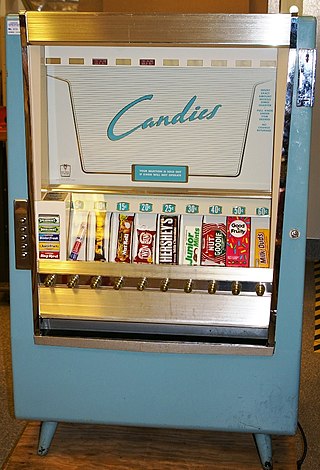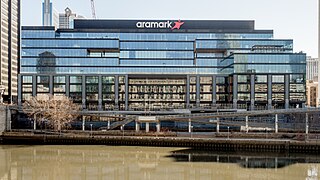
Bakelite, formally polyoxybenzylmethyleneglycolanhydride, is a thermosetting phenol formaldehyde resin, formed from a condensation reaction of phenol with formaldehyde. The first plastic made from synthetic components, it was developed by Leo Baekeland in Yonkers, New York, in 1907, and patented on December 7, 1909.

A vending machine is an automated machine that dispenses items such as snacks, beverages, cigarettes, and lottery tickets to consumers after cash, a credit card, or other forms of payment are inserted into the machine or payment is otherwise made. The first modern vending machines were developed in England in the early 1880s and dispensed postcards. Vending machines exist in many countries and, in more recent times, specialized vending machines that provide less common products compared to traditional vending machine items have been created.

A zipper, zip, or fly, formerly known as a clasp locker, is a commonly used device for binding together two edges of fabric or other flexible material. Used in clothing, luggage and other bags, camping gear, and many other items, zippers come in a wide range of sizes, shapes, and colors. In 1892, Whitcomb L. Judson, an American inventor from Chicago, patented the original design from which the modern device evolved.

Injection moulding is a manufacturing process for producing parts by injecting molten material into a mould, or mold. Injection moulding can be performed with a host of materials mainly including metals, glasses, elastomers, confections, and most commonly thermoplastic and thermosetting polymers. Material for the part is fed into a heated barrel, mixed, and injected into a mould cavity, where it cools and hardens to the configuration of the cavity. After a product is designed, usually by an industrial designer or an engineer, moulds are made by a mould-maker from metal, usually either steel or aluminium, and precision-machined to form the features of the desired part. Injection moulding is widely used for manufacturing a variety of parts, from the smallest components to entire body panels of cars. Advances in 3D printing technology, using photopolymers that do not melt during the injection moulding of some lower-temperature thermoplastics, can be used for some simple injection moulds.

Vacuum forming is a simplified version of thermoforming, where a sheet of plastic in various forms of High Impact Polystyrene Sheet (HIPS) for low impact products, or ABS for bathroom shower trays, and HDPE for exterior vehicle parts, plus various other types of vacuum formable materials) is heated to a forming temperature, stretched onto a single-surface mould, and forced against the mould by a vacuum. This process can be used to form plastic into permanent objects such as turnpike signs and protective covers. Normally draft angles are present in the design of the mould to ease removal of the formed plastic part from the mould.

A reverse vending machine (RVM) is a machine that allows a person to insert a used or empty glass bottle, plastic bottle, or aluminum can in exchange for a reward. After inserting the recyclable item, it is then compacted, sorted, and analyzed according to the number of ounces, materials, and brand using the universal product code on the bottle or can. Once the item has been scanned and approved, it is then crushed and sorted into the proper storage space for the classified material. Upon processing the item, the machine rewards people with incentives, such as cash or coupons.

Blow molding is a manufacturing process for forming hollow plastic parts. It is also used for forming glass bottles or other hollow shapes.

Rotational molding involves a heated mold which is filled with a charge or shot weight of the material. It is then slowly rotated, causing the softened material to disperse and stick to the walls of the mold forming a hollow part. In order to form an even thickness throughout the part, the mold rotates at all times during the heating phase, and then continues to rotate during the cooling phase to avoid sagging or deformation. The process was applied to plastics in the 1950s but in the early years was little used because it was a slow process restricted to a small number of plastics. Over time, improvements in process control and developments with plastic powders have resulted in increased use.
The Mills Novelty Company, Incorporated of Chicago was once a leading manufacturer of coin-operated machines, including slot machines, vending machines, and jukeboxes, in the United States. Between about 1905 and 1930, the company's products included the Mills Violano-Virtuoso and its predecessors, celebrated machines that automatically played a violin and, after about 1909, a piano. By 1944, the name of the company had changed to Mills Industries, Incorporated. The slot machine division was then owned by Bell-O-Matic Corporation. By the late 1930s, vending machines were being installed by Mills Automatic Merchandising Corporation of New York.

An injection molding machine, also known as an injection press, is a machine for manufacturing plastic products by the injection molding process. It consists of two main parts, an injection unit and a clamping unit.

The Bemis Manufacturing Company is an American manufacturing company based in Sheboygan Falls, Wisconsin, and is best known for its toilet seat products. Bemis also manufactures suction canisters, sharps containers, fluid management systems, gas caps, gauges and various contracted injection molded plastic parts for companies such as John Deere and Whirlpool Corporation. The company is a pioneer of co-injection molding, a process in which virgin resin is injected with scrap plastic.
DISAMATIC is an automatic production line used for fast manufacturing of sand molds for sand casting. This process is often used to mass manufacture metal castings for the automotive and machine industries.
Hobby injection molding machines, also known as benchtop injectors, hold molds on a smaller scale. Benchtop injectors have become more common as inexpensive CNC milling machines have reduced the cost of producing molds in a home workshop.

Aramark is an American food service and facilities services provider to clients in areas including education, prisons, healthcare, business, and leisure. It operates in North America and an additional 14 countries, including the United Kingdom, Germany, Chile, the Republic of Ireland, and Spain.
A molded interconnect device (MID) is an injection-molded thermoplastic part with integrated electronic circuit traces. The use of high temperature thermoplastics and their structured metallization opens a new dimension of circuit carrier design to the electronics industry. This technology combines plastic substrate/housing with circuitry into a single part by selective metallization.

Gemini Group, Inc. is a supplier of engineered plastic and metal products to OEM's and Tier 1 suppliers. The company operates internationally from its headquarters in Bad Axe, Michigan in the United States.
Prizes are promotional items—small toys, games, trading cards, collectables, and other small items of nominal value—found in packages of brand-name retail products that are included in the price of the product with the intent to boost sales, similar to toys in kid's meals. Collectable prizes produced in series are used extensively—as a loyalty marketing program—in food, drink, and other retail products to increase sales through repeat purchases from collectors. Prizes have been distributed through bread, candy, cereal, cheese, chips, crackers, laundry detergent, margarine, popcorn, and soft drinks. The types of prizes have included comics, fortunes, jokes, key rings, magic tricks, models, pin-back buttons, plastic mini-spoons, puzzles, riddles, stickers, temporary tattoos, tazos, trade cards, trading cards, and small toys. Prizes are sometimes referred to as "in-pack" premiums, although historically the word "premium" has been used to denote an item that is not packaged with the product and requires a proof of purchase and/or a small additional payment to cover shipping and/or handling charges.
Protolabs is a company that provides rapid manufacturing of low-volume 3D printed, CNC-machined, sheet metal, and injection-molded custom parts for prototyping and short-run production. Markets like medical devices, electronics, appliances, automotive and consumer products use these parts. Protolabs' headquarters and manufacturing facilities are located in Maple Plain, Minnesota. The company also has manufacturing facilities in England, Germany, and Japan.
Frank G. Pellegrino was an American engineer, inventor, and industrialist. He served as president of the General Fibre Company. During his tenure, General Fibre became the largest manufacturer of duck decoy models in the United States, producing over a million per year in the 1950s. Pellegrino also negotiated the sale of the International Hat Company to Interco, Inc. Additionally, he created a variety of inventions related to the plastic molding industry. Most notably, Pellegrino invented automated assembly line machines in the formation of plastic objects. These machines were used by General Fibre in the production of a variety of plastic models, duck decoys, and Michelob paraphernalia throughout the 1960s to 1980s.
Nosco Plastics, Inc. was the plastics molding division of National Organ Supply Company created in 1934 to make plastic parts for electric organs and was located at 1701 Gaskell Avenue, Erie, Pennsylvania, 16503. Beginning in 1948 with the implementation of the newly developed screw injection molding process, NOSCO quickly became a major early producer of tiny plastic toys called "slum" sold to wholesalers as carnival merchandise, used by the millions as prizes in packages of Cracker Jack popcorn confection, and mail-order flats that were heavily advertised in American comic books as "100 Toy Soldiers for $1" by E. Joseph Cossman & Company. NOSCO also held a number of patents on plastic molded products including mechanical toys, storage containers, pallets, and medical syringes.













